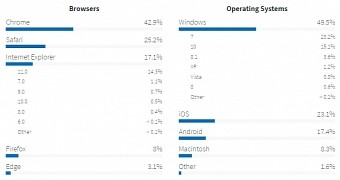We all know that Windows 10 is growing, and it’s no surprise here, as Microsoft itself pushed the new OS very aggressively during the free upgrade campaign, and enterprises are now completing the piloting stage and preparing to perform the transition to the new OS too.
Data provided by the US government’s website analytics service reveals that Windows 10 adoption is indeed on the rise, but this doesn’t necessarily mean that it’s ready to overtake Windows 7.
The figures collected after 2.05 billion visits on US government websites over the past 90 days show that Windows 7 is still the leading choice for users with a share of 28.2 percent while Windows 10 is second with 15.1 percent. Windows 8.1 and XP are next with 3.6 and 1.2 percent, respectively.
More important is that Windows continues to remain the top OS used to visit government websites, as it currently has a share of 49.5 percent while iOS is the runner-up with 23.1 percent. Android is only third, but not far behind, with 17.4 percent, followed by Mac OS X with 8.3 percent.
Google Chrome, top browser
As far as the browsers used to load government websites are concerned, Google Chrome is the leading choice with 42.9 percent, and Safari is second with 25.2 percent. These stats make sense because Chrome is available cross-platform and can be used on both desktops and mobile devices while Safari is offered on iOS and Mac devices too.
Internet Explorer is only third with 17.1 percent while Edge, the new default Windows 10 browser, is far behind with just 3.1 percent.
Certainly, these statistics show that Windows 10 still has what it takes to overtake Windows 7, but it just seems like it’ll take longer for this to happen than expected.
Windows 7 support comes to an end in January 2020, and unless Microsoft finds a way to upgrade all users to Windows 10 as soon as possible, the company is very likely to experience another Windows XP moment when people refuse to jump ship despite the security risks brought by end of support.

 14 DAY TRIAL //
14 DAY TRIAL //